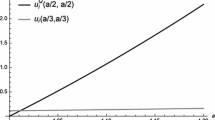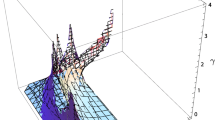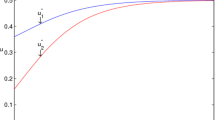Abstract
In this paper, we consider a class of mixed duopoly games with a nonlinear demand function. We investigate the quantizations of mixed duopoly games by the Li–Du–Massar and Frackiewicz quantum schemes. By solving the quantum equilibrium quantities, profits and objectives, we find that the quantum equilibrium quantities and objectives are all monotonically increasing with respect to entanglement level, and the quantum equilibrium profits are monotonically decreasing with respect to entanglement level. Our main contribution is to consider some new quantum game models by the existing quantum schemes.






Similar content being viewed by others
Data availibility
All data included in this study are available upon request by contact with the corresponding author.
References
Meyer, D.A.: Quantum strategies. Phys. Rev. Lett. 82(5), 1052–1055 (1999)
Eisert, J., Wilkens, M., Lewenstein, M.: Quantum games and quantum strategies. Phys. Rev. Lett. 83(15), 3077–3080 (1999)
Benjamin, S.C., Hayden, P.M.: Multiplayer quantum games. Phys. Rev. A 64, 030301 (2001)
Li, H., Du, J., Massar, S.: Continuous-variable quantum games. Phys. Lett. A 306, 73–78 (2002)
Du, J., Li, H., Ju, C.: Quantum games of asymmetric information. Phys. Rev. E 68, 016124 (2003)
Zhou, J., Ma, L., Li, Y.: Multiplayer quantum games with continuous-variable strategies. Phys. Lett. A 339, 10–17 (2005)
Lo, C.F., Kiang, D.: Quantum Stackelberg duopoly. Phys. Lett. A 318, 333–336 (2003)
Lo, C.F., Kiang, D.: Quantum Stackelberg duopoly with incomplete information. Phys. Lett. A 346, 65–70 (2005)
Lo, C.F., Yeung, C.F.: Quantum Stackelberg oligopoly. Quantum Inf. Process. 21, 85 (2022)
Yang, Z., Zhang, X.: Quantum repeated games with continuous-variable strategies. Phys. Lett. A 383, 2874–2788 (2019)
Alonso-Sanz, R.: Simulation of the quantum Cournot duopoly game. Physica A 534, 122116 (2019)
Yang, Z., Gong, Q.: Nonlinear dynamics of continuous-variable quantum games with bounded rationality. Quantum Inf. Process. 17, 302 (2018)
Shi, L., Xu, F.: Nonlinear dynamics in a heterogeneous quantum Cournot duopoly game with isoelastic demand. Quantum Inf. Process. 20, 310 (2021)
Frackiewicz, P.: Remarks on quantum duopoly schemes. Quantum Inf. Process. 15, 121–136 (2016)
Frackiewicz, P., Pykacz, J.: On subgame perfect equilibria in quantum Stackelberg duopoly. Phys. Lett. A 382, 561–565 (2018)
Frackiewicz, P.: On subgame perfect equilibria in quantum Stackelberg duopoly with incomplete information. Phys. Lett. A 382, 3463–3469 (2018)
Shi, L., Xu, F., Chen, Y.: Quantum Cournot duopoly game with isoelastic demand function. Physica A 566, 125614 (2021)
Shi, L., Xu, F.: Quantum Stackelberg duopoly game with isoelastic demand function. Phys. Lett. A 385, 126956 (2021)
Gong, Q., Yang, Z.: Differential quantum duopoly games. Physica A 598, 127376 (2022)
Wang, N.. F., Yang, Z.: Nonlinear quantum Cournot duopoly games. J. Phys. A Math. Theor. 55(42), 425306 (2022)
Makowski, M., Piotrowski, E.W., Frackiewicz, P., Szopa, M.: Transactional interpretation for the principle of minimum Fisher information. Entropy 23, 1464 (2021)
Makowski, M., Piotrowski, E.W.: Transactional interpretation and the generalized Poisson distribution. Entropy 24, 1416 (2022)
Amir, R., De Feo, G.: Endogenous timing in a mixed duopoly. Int. J. Game Theory 43(3), 629–658 (2014)
Offerman, T., Potters, J., Sonnemans, J.: Imitation and belief learning in an oligopoly experiment. Rev. Econ. Stud. 69, 973–997 (2002)
Agiza, H.N., Hegazi, A.S., Elsadany, A.A.: Complex dynamics and synchronization of a duopoly game with bounded rationality. Math. Comput. Simul. 58(2), 133–146 (2002)
Naimzada, A.K., Sbragia, L.: Oligopoly games with nonlinear demand and cost functions: two boundedly rational adjustment processes. Chaos, Solitons Fractals 29(3), 707–722 (2006)
Mas-Colell, A., Whinston, M.D., Green, J.R.: Microeconomic Theory. Oxford University Press, Oxford (1995)
Acknowledgements
The authors gratefully acknowledge the anonymous reviewers and Editor-in-Chief Yaakov S Weinstein for their constructive comments and valuable suggestions. This study is supported by the Innovation Exploration and Academic New Seedling Project of Guizhou University of Finance and Economics (No. 2022XSXMB22), and the Guizhou Key Laboratory of Big Data Statistical Analysis(No. [2019]5103).
Funding
The authors declare that they have no known competing financial interests or personal relationships that could have appeared to influence the work reported in this paper.
Author information
Authors and Affiliations
Corresponding author
Ethics declarations
Conflict of interest
The authors declare that they have no conflict of interest.
Additional information
Publisher's Note
Springer Nature remains neutral with regard to jurisdictional claims in published maps and institutional affiliations.
Rights and permissions
Springer Nature or its licensor (e.g. a society or other partner) holds exclusive rights to this article under a publishing agreement with the author(s) or other rightsholder(s); author self-archiving of the accepted manuscript version of this article is solely governed by the terms of such publishing agreement and applicable law.
About this article
Cite this article
Wang, N., Yang, Z. Quantum mixed duopoly games with a nonlinear demand function. Quantum Inf Process 22, 139 (2023). https://doi.org/10.1007/s11128-023-03894-6
Received:
Accepted:
Published:
DOI: https://doi.org/10.1007/s11128-023-03894-6




